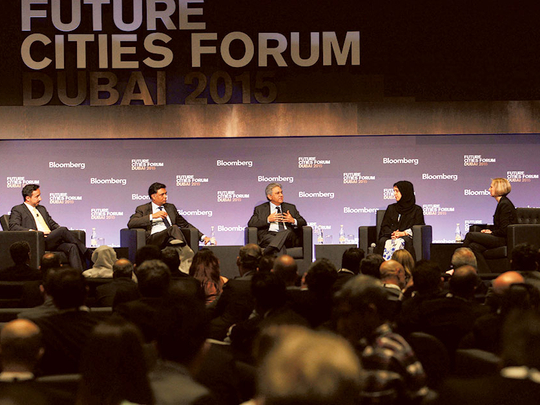
Dubai: The UAE has every ingredient to become an economic growth hub among the leading growth centres of the world, according to a panel of business leaders, investors, members of the financial community at a forum organised by Bloomberg on Tuesday.
Dubai’s dramatic transformation over the last three decades to become a major business centre with a more dynamic and diversified economy has attracted people from more than 200 nationalities to live, work and do business here. The city enjoys a strategic location and serves as the biggest re-exporting centre in the Middle East.
“The geographical advantage of being a trade hub, the diverse nature of the population and the inclusivity makes the environment conducive for innovation. We expect these factors to drive the UAE’s advance towards becoming a global growth hub,” said Reem Al Hashemi, UAE Minister of State and managing director of Dubai Expo 2020.
A major advantage for Dubai as a future economic hub comes from its geographical location and close proximity to the world’s highly populous countries, panellists said.
“Dubai is emerging as an anchor city for economic growth for more than 2 billion people across the Middle East, Africa, India and the neighbouring region,” said Arif Naqvi, founder and group chief executive of Abraaj Group.
The emirate’s low logistical and operational costs, excellent infrastructure, international outlook and liberal policies are attracting investors in a big way.
“The city has an open mercantile characteristic which has attracted people from around the world. There are more than 580 weekly flights between Dubai and India and we expect the same to happen between Africa and Dubai and the CIS [the Commonwealth for Independent States] and Dubai in the future,” said Ashok Aram, chief executive of Deutsche Bank in the Middle East.
Activities such as trade, transport, tourism, industry and finance have shown steady growth and helped the economy to achieve a high degree of expansion and diversification. However Dubai’s march towards a high-growth economy has also faced some serious challenges in the recent past.
Having a globalised economy, Dubai it is not immune to global economic events. The real estate crisis that followed the global financial crisis was one such event.
“The crisis was the result of excessive behaviour but it was contained and lessons were learnt quickly. The city has moved on and has adapted well to the changed environment,” said Marios Maratheftis, chief economist of Standard Chartered Bank.
The UAE economy enjoys a competitive combination of cost, market and environmental advantages that create an ideal and attractive investment climate for local and foreign investment. While the geopolitical challenges in the neighbourhood are global news headlines, businesses operating on the ground believe that the UAE and Dubai has benefited from both the turbulence and economic growth in the region.
“We have a unique situation here. When there are geopolitical challenges in the region, the UAE attracts regional investments because of its safe-haven status. When the regional economies are doing well, the country would attract more business because of its regional hub status,” Naqvi said.










